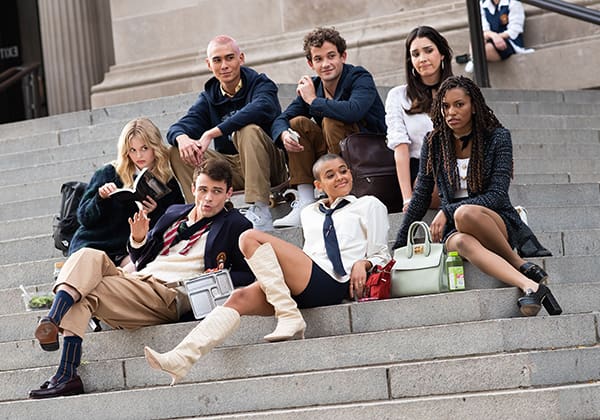When HBO Max dropped the trailer for the new Gossip Girl reboot, I won’t lie, I was excited. Having just finished a mid-lockdown binge of the OG 2007-2012 series, I was more than ready to delve into the lives of more rich people, now with a far more diverse cast and the promise of relevant, socially aware plotlines. And when I heard that Kristen Bell was back, with a voice sexier than ever? Over the moon.
Then I actually watched the show. Spoiler alert: it sucks. The problem with trying to inject social awareness into a world that celebrates the out-of-touch nature of rich people is that you end up with a show that lacks impact, and any meaningful message is lost. Instead, we’re left with this GG reboot, where the wealthy oscillate between displaying extreme “wokeness” and acting under entirely selfish motivations. The show (so far) is a cycle of one character doing something terrible, immediately feeling bad, and apologising. Discussions of social issues, from feminism to climate change, feel tokenistic and performative in the context of “Manhattan’s elite.”
My personal problem with “wokeifying” Gossip Girl is the implication the show seems to make that we, the ordinary viewer, should empathise with these wealthy teens. Despite the original producers of Gossip Girl (Safran, Schwartz, and Savage) being on the show, the essence of it appears to be lost. The original revelled in gratuitous wealth and petty teens, laughing at the awfulness of it all. It was entertaining because it didn’t apologise or take itself too seriously. The show understood that I don’t want to empathise with rich people. I want them to be completely awful, and I want to laugh at how ridiculous their lives are. I don’t want to watch them be nice to each other, and I don’t want to be asked to congratulate them for giving a crap about the rest of the world.
A through-line of the show is the issue of gentrification in NYC, where a building commonly lived in by homeless people is being bought. This culminates in the midseason finale (spoiler alert) at a protest. Obie Bergmann IV (played by Eli Brown), whom the show describes as “guilty rich”, shows up at the protest. Another wealthy teen, Julien Calloway (played by Jordan Alexander) also shows up. The fact that both are there is apparently a really big deal.
Personally, I don’t like to pat the one percent on the back for taking a stand—but each to their own. The protest falls apart as police show up and begin tear-gassing civilians. This could’ve been very poignant, an echo of the recent violence in the US, but instead is used as an edgy backdrop to Obie and Julien’s impromptu make-out sesh in a random alley. Instead of active engagement with the very real injustices of our time, the show again centres our so-called “woke” teens and thereby renders any possible impact weightless.
Class awareness is obviously a big part of Gossip Girl, OG and reboot. The original, although by no means perfect, attempted to provide a ‘lower-class’ perspective via the Humphreys (although I feel like their Brooklyn loft tells a different story—for real, how did they afford that?). This was accompanied by a surprisingly interesting discourse in the simultaneous disgust and desire we feel watching the upper-class characters flaunt their wealth. The reboot, as expected, gives this discourse its best shot, but it falls flat. This is because, along with its “rich people are people too” agenda, the reboot is also trying desperately to distinguish itself from the original, and so can’t just follow the same line of thinking.
What is produced, then, is this weird plot point where the teachers (pretty much our only look into how the ‘other half’ lives) are the new Gossip Girl. They start an Instagram account, inspired by the original blog, to keep the students in line. It’s a bold choice on behalf of the producers, presented as an interesting take on the economic flaws of the education system, and the struggles of teachers in an influencer dominated culture. One teacher queries, “Who needs an education when you’re famous for putting on your makeup?” Unfortunately, what it really does is present the viewer with three teachers who become increasingly unlikable and unsympathetic as the show goes on. A quick list of (only some) of their offences: taking semi-nude pictures of a fourteen-year-old girl, sharing the private information of students online, getting a fellow teacher fired.
Perhaps we could write this off as an attempt to replicate some of that classic, problematic drama from the OG series, but ultimately it’s in poor taste. In attempting to tackle, or at the very least touch on, multiple social issues the reboot seems to forget what it’s actually about. Rich teenagers doing rich teenager things.
By attempting to insert social awareness into the excessive world of the socially unaware, the Gossip Girl reboot sets itself up for failure before it has even begun.





